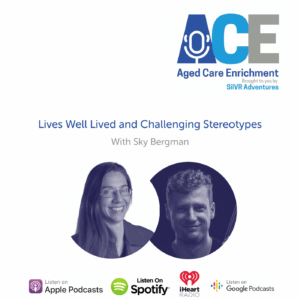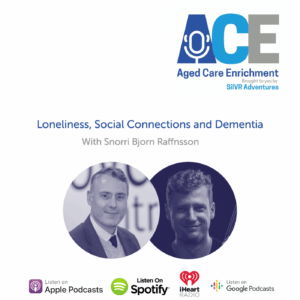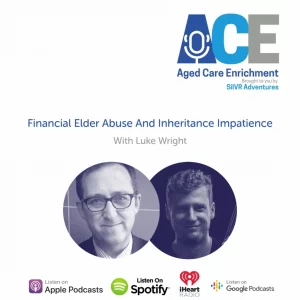Rob Hardy and LGBTIQ+ Health Australia
Today’s episode is with Rob Hardy from LGBTIQ+ Health Australia, or LHA for short, about supporting LGBTI older adults in care, and some barriers and challenges to care that we may not have thought. LHA are the peak body focusing on health services for LGBTIQ+ Australians and they tackle areas like mental health, disability, palliative and also their aged care project Silver Rainbow, which you can find out more about on their website. This can be an uncomfortable topic for some people, and Rob does a great job of explaining what all the letters mean, what are some common experiences for LGBTI people and how we can be sensitive and supportive of people’s gender and sexuality even if it all feels a bit unfamiliar.
Snippet : LGBTI & Dementia
"One of the fears for many LGBTI people in aged care who had dementia, is that as the dementia progresses over time, they feel that they may forget their gender or not be able to communicate that or even their current relationships, and that they might be automatically assumed to be a particular gender or assumed to be heterosexual or assume that their bodies look a certain way."
-Rob Hardy
LGBTIQ+ and older adults
The LGBTIQ+ acronym covers individuals who identify as lesbian, gay, bisexual, transgender, intersex and queer. The additional + at the end represents other diverse sexualities and gender identities. When it comes to ‘queer’ however, though this may be a term that’s commonly used, it may not be so acceptable or respectful for older adults. Historically it was used as an offensive term, and when it comes to dealing with older adults, there should be some awareness that they may perceive this term differently as it may bring up past traumatic experiences.
Past experiences
People in the LGBTI community experience life much differently as older Australians. Their historical perspective has shaped their present reality as they came from a time when their very identities were criminalised. Huge advances have been made in the past few decades surrounding laws and the Marriage Act which have been very affirming but older adults lived in a time where their lives were lived in secrecy due to the fear of being discriminated or even arrested. All of this must have been a very traumatic experience for them and they end up carrying on that fear today with certain aspects of life.
Accessing services like government services in aged care facilities may possibly trigger some fear due to previous distrust shaped by their personal experiences in the past. So going on the basis that they’ve lived their whole lives in secrecy, accesing aged care services may be problematic due to mistrust and fear of vulnerability. This fear may fester on to the point where older adults in aged care facilities may decide to stay in the closet or even go back to the closet. That’s why it’s crucial that they be accepted into the right facility that they can trust to be open and inclusive.
An inclusive space
The Department of Health is working with aged care providers to have standards to identify the aged care providers that would be considered inclusive. At the moment, aged care providers don’t have any standards or accreditations to prove their credibility except for word-of-mouth. It is important for there to be a minimum standard of ongoing training for staff within these facilities and policies applied at a cultural level to ensure inclusivity for both LGBTI older people and the staff as well.
It all starts from asking inclusive questions to get to know them better and building the trust so they get more comfortable with sharing aspects of their identity which is really important in accomodating them. The biggest fear for people living with dementia is that they may forget their identity and not be able to express it and they may be assumed to be a particular gender or orientation. This is why aspects of their identity like pronouns, gender identity, orientation and life history are particularly important so they can be supported and treated respectfully throughout their journey. There’s also the Gender Passport where an individual’s name, pronouns and particular needs for supporting them, their health and body are stated. This is used as a reference for support to affirm their gender or sexual identity.
Trauma-informed care
LHA has recently worked with Dementia Support Australia to develop guidelines called LGBTI and Dementia to understand changes in behaviour for the LGBTI community who have dementia and how to support them in a way that is trauma-informed. This means that an older adult’s previous trauma is acknowledged and precaution is taken so as to not trigger horrifying memories of the past where these individuals were not accepted in society. The aim is to provide a safe place for their individual identities where they feel affirmed. Every older adult in the LGBTI community should be able to walk into a residential aged care facility that is funded by the government and expect to be treated respectfully while having their individual needs met.




